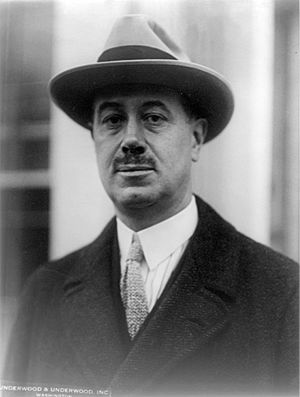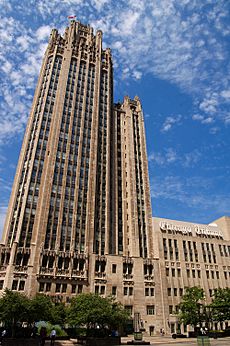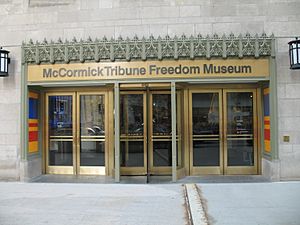Robert R. McCormick facts for kids
Quick facts for kids
Robert R. McCormick
|
|
|---|---|
 |
|
| Born |
Robert Rutherford McCormick
July 30, 1880 Chicago, Illinois, U.S.
|
| Died | April 1, 1955 (aged 74) Wheaton, Illinois, U.S.
|
| Alma mater | Yale University (AB) Northwestern University (LLB) |
| Known for | Chicago Tribune |
| Political party | Republican |
| Movement | Non-interventionism |
| Spouse(s) |
Amie Irwin Adams
(m. 1915; died 1939)Maryland Mathison Hooper
(m. 1944) |
| Parent(s) | Robert Sanderson McCormick Kate Medill |
| Relatives | See family tree |
Robert Rutherford "Colonel" McCormick (born July 30, 1880 – died April 1, 1955) was an American lawyer, businessman, and activist who spoke out against war.
He was part of the important McCormick family from Chicago. Robert McCormick became a lawyer and a Republican alderman in Chicago. He served as a brave U.S. Army officer in World War I. Later, he became the owner and publisher of the Chicago Tribune newspaper. He was a leading Republican who believed the U.S. should not get involved in other countries' problems. He was against the government getting too much power during the New Deal. He also did not want America to join World War II. Today, his legacy includes the McCormick Foundation, which is a group that gives money to good causes.
Contents
Early Life and Education Abroad
Robert McCormick was born on July 30, 1880, in Chicago. His parents were Robert Sanderson McCormick and Katherine Van Etta Medill McCormick. His family called him "Bertie" because many relatives had the same name. His grandfather, Joseph Medill, was an editor for the Tribune and a former mayor of Chicago. Robert lived on his grandfather's estate for much of his adult life.
His great-uncle was the famous inventor and businessman Cyrus McCormick. Robert's older brother, Joseph Medill McCormick, was supposed to take over the family newspaper. But his brother was more interested in politics. He became a member of the U.S. House of Representatives and then the U.S. Senate.
From 1889 to 1893, Robert lived in London with his parents. His father worked there for the American government. Later, his father became an ambassador to other countries like Austria-Hungary, Russia, and France.
While in London, Robert went to Ludgrove School. He then returned to the United States and attended Groton School. In 1899, he started at Yale College and graduated in 1903. After Yale, Robert McCormick studied law at the Northwestern University School of Law. After finishing law school, he worked as a clerk at a law firm in Chicago.
Career Highlights
Robert McCormick became a lawyer in Illinois in 1907. The next year, he helped start a law firm called Kirkland & Ellis. This firm worked for the Tribune Company. In 1908, Robert became more involved in the family newspaper business. He continued to be a partner in his law firm until 1920.
In 1910, Robert McCormick took charge of the Chicago Tribune. By 1914, he became both the editor and publisher. He shared this role with his cousin, Captain Joseph Medill Patterson. In 1919, Patterson moved to New York City and started the New York Daily News. Robert and his cousin often disagreed, but they both worked for the Chicago Tribune until 1926. After that, McCormick took full control of the Tribune, and Patterson focused on the New York Daily News.
In 1904, Robert McCormick was asked to run for alderman in Chicago. He won and served on the Chicago City Council for two years. In 1905, when he was 25, he was chosen to lead the Chicago Sanitary District. This group managed the city's large water and sewage system. He also joined other city planning groups. However, his political career ended when he took over the Tribune.
In February 1915, Robert McCormick went to Europe as a reporter for the Tribune during World War I. He interviewed important leaders like Tsar Nicholas and Winston Churchill. McCormick also visited the battlefields on both the Eastern and Western Fronts. He even collected pieces of damaged buildings, which were later placed in the Tribune Tower.
Military Service
After returning to the U.S. in 1915, McCormick joined the Illinois National Guard in June 1916. Because of his background and riding skills, he became a major in the 1st Cavalry Regiment. President Woodrow Wilson had called the National Guard to patrol the Mexican border. McCormick went with his regiment to the border.
When the United States joined World War I, the Illinois National Guard was sent to Europe. McCormick became part of the U.S. Army in June 1917. He was sent to France as an intelligence officer. He wanted to be more active in the war, so he went to an artillery school.
By June 1918, McCormick became a lieutenant colonel. By September 1918, he was promoted to a full colonel in the field artillery. He fought in important battles like the capture of Cantigny. He later named his farm estate near Wheaton, Illinois "Cantigny" after this battle. He also fought in the battles of Soissons, Saint-Mihiel, and the Argonne. His military service ended in December 1918. He received the Distinguished Service Medal for his brave actions. After this, he was always known as "Colonel McCormick."
Publisher and Innovator
After the war, McCormick took full control of the Tribune in the 1920s. He and his cousin Joseph Medill Patterson helped start the Medill School of Journalism at Northwestern University. This school was named after their grandfather.
As the publisher of the Tribune, McCormick was involved in many legal cases about freedom of the press. He was a strong supporter of a free press.

McCormick was a conservative Republican. He did not agree with President Franklin D. Roosevelt and his New Deal policies. He even compared the New Deal to Communism. For a short time in 1935, he showed a 47-star American flag outside the Tribune Tower. He removed the 13th star, which stood for Rhode Island, to protest the state's Democratic judges. He stopped when he was told it was against the law to change the flag.
He also believed the U.S. should not get involved in World War II. He thought America should not "rescue the British Empire". In December 1941, just before the attack on Pearl Harbor, he published a secret military plan. This plan showed how the U.S. was preparing for war.
McCormick was also very creative as a publisher. He owned part of the Tribunes powerful radio station, WGN. The letters WGN stood for the Tribunes motto: "World's Greatest Newspaper." In 1936, he also created the town of Baie-Comeau, Quebec, in Canada. He built a paper mill and a hydroelectric power plant there. The plant, called McCormick Dam, made electricity for the paper mill.
McCormick used the Tribune to fight against many things he disagreed with. These included certain politicians, gangsters, labor unions, and prohibition. He also spoke out against Wall Street, the East, Democrats, and the New Deal. He was against international groups like the League of Nations and the United Nations. He also disliked British imperialism, socialism, and communism.
Some of his personal campaigns were seen as unusual, like his attempts to change English spelling. Other newspapers made fun of him in cartoons. They called him "Colonel McCosmic," showing him as a proud, bossy person.
In 1943, he told people that he helped plan a defense against an invasion from Canada after World War I. In 1947, he threw a huge party for the Tribune's 100th birthday. It included a fireworks show that was called "the most colossal show since the Chicago fire."
McCormick bought the Washington Times-Herald newspaper in 1948. This paper was known for being against foreign involvement and very conservative. McCormick put his niece, Ruth "Bazy" McCormick Miller, in charge of the paper in 1949. He wanted her to use the paper to spread "American principles." But they disagreed about how the paper should be run and about her relationship with an editor. She resigned from the Times-Herald.
McCormick tried to run the paper himself, but he lost money. In 1954, he sold the Times-Herald to The Washington Post. The Post then closed the Times-Herald.
Personality
Some people saw McCormick as a serious, distant, and powerful person. He was described as someone who lived in luxury and did not care much for ordinary people. Others saw him as a strong and brave leader, but also someone to be feared. He was sometimes called an "eccentric genius" because of his unusual ideas and reserved manner. One opponent called him "the greatest mind of the fourteenth century."
Death and Legacy
Robert McCormick's health began to fail after a trip to Europe in April 1953. But he kept working until the month before he died on April 1, 1955. He was buried on his farm, wearing his war uniform. His second wife lived for another 30 years after him.
McCormick did not have children. When he died, he left about $55 million, including shares in the Chicago Tribune Company. His will created a trust for charity. This trust helps maintain his former home, which is now Cantigny Park and includes a museum. The Northwestern University School of Law building, opened in 1962, was named McCormick Hall after a donation from his foundation. In 1989, the Robert R. McCormick School of Engineering and Applied Science at Northwestern University was also named after him.
Soon after McCormick's death, Richard J. Daley became mayor of Chicago. A new family, linked to the Democratic Party, would lead Chicago for over 50 years. McCormick had always wanted a convention center built in Chicago. So, when one was built from 1957 to 1960, it was named McCormick Place in his honor.
The trust eventually sold its ownership of the Tribune Company. In 2008, it changed its name from the McCormick Tribune Foundation to the Robert R. McCormick Foundation. This foundation has given over a billion U.S. dollars to support journalism, early childhood education, community health, and arts and culture.
McCormick also gave money for five scholarships at The Citadel, The Military College of South Carolina. He gave his estate in Aiken, South Carolina, to his friend and former commander, Charles Pelot Summerall. After Summerall's death, the estate was sold. The money was used to buy a beach house in Isle of Palms, South Carolina. This house is now called the Robert R. McCormick Citadel Beach Club.
McCormick's influence also reached Canada, where his grandfather Joseph Medill was born. Six towns were created for making paper: Heron Bay, Gore Bay, Thorold (all in Ontario), Baie-Comeau, Franquelin, and Shelter Bay (all in Quebec). Many monuments honor the Colonel. In Baie-Comeau, there is a large bronze statue of him canoeing. He was canoeing in 1915 when he found the land where the town would be built in 1937. The statue was made by American sculptor Wheeler Williams. In 1955, a cargo vessel was renamed the Col. Robert R. McCormick in his honor.
Family tree
Paternal side
|
|||||||||||||||||||||||||||||||||||||||||||||||||||||||||||||||||||||||||||||||||||||||||||||||||||||||||||||||||||||||||||||||||||||||||||||||||||||||||||||||||||||||||||||||||||||||||||||||||||||||||||||||||||||||||||||||||||||||||||||||||||||||||||||||||||||||||||||||||||||||||||||||||||||||||||||||||||||||||||||||||||||||||||||||||||||||||||||||||||||||||||||||||||||||||||||||||||||||||||||||||||||||||||||||||||||||||||||||||||||||||||||||||||||||||||||||||||||||||||||||||||
| Notes: | |||||||||||||||||||||||||||||||||||||||||||||||||||||||||||||||||||||||||||||||||||||||||||||||||||||||||||||||||||||||||||||||||||||||||||||||||||||||||||||||||||||||||||||||||||||||||||||||||||||||||||||||||||||||||||||||||||||||||||||||||||||||||||||||||||||||||||||||||||||||||||||||||||||||||||||||||||||||||||||||||||||||||||||||||||||||||||||||||||||||||||||||||||||||||||||||||||||||||||||||||||||||||||||||||||||||||||||||||||||||||||||||||||||||||||||||||||||||||||||||||||
Maternal side
|
||||||||||||||||||||||||||||||||||||||||||||||||||||||||||||||||||||||||||||||||||||||||||||||||||||||||||||||||||||||||||||||||||||||||||||||||||||||||||||||||||||||||||||||||||||||||||||||||||||||||||||||||||||||||||||||||||||||||||||||||||||||||||||||||||||||||||||||||||||||||||||||||||||||||||||||||||||||||||||||||||||||||||||||||||||||||||||||||||||||||||||||||||||||||||||||||||||||||||||||||||||||||||||||||||||||||||||||||||||||||||||||||||||||||||||||||||||||||||||||||||||||||||||||||||||||||||
| Notes: | ||||||||||||||||||||||||||||||||||||||||||||||||||||||||||||||||||||||||||||||||||||||||||||||||||||||||||||||||||||||||||||||||||||||||||||||||||||||||||||||||||||||||||||||||||||||||||||||||||||||||||||||||||||||||||||||||||||||||||||||||||||||||||||||||||||||||||||||||||||||||||||||||||||||||||||||||||||||||||||||||||||||||||||||||||||||||||||||||||||||||||||||||||||||||||||||||||||||||||||||||||||||||||||||||||||||||||||||||||||||||||||||||||||||||||||||||||||||||||||||||||||||||||||||||||||||||||
 | DeHart Hubbard |
 | Wilma Rudolph |
 | Jesse Owens |
 | Jackie Joyner-Kersee |
 | Major Taylor |


